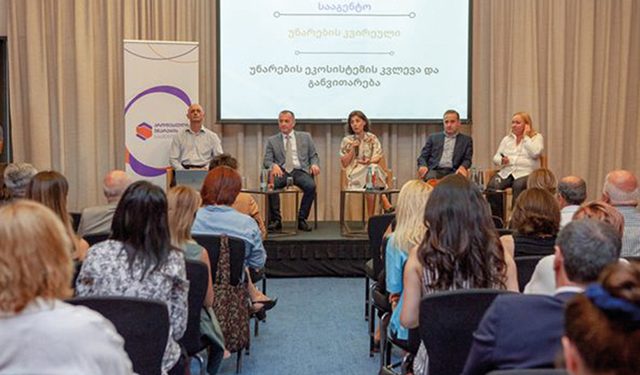High quality vocational education and training can be a pathway to success for many Georgians struggling with unemployment and poverty. Around 34% of Georgian youth are currently classified as not in employment, education or training (NEET) while youth unemployment exceeds 40% in some of the regions.
To give vocational education and training a boost, Georgia’s newly established Skills Agency, with support from the Swiss Agency for Development and Cooperation (SDC) and the United Nations Development Program (UNDP), launched a Skills Week, aiming to discuss more effective educational models and greater cooperation between educational institutions and the private sector. Interactive and innovative events, presentations and discussions organized on 18-22 July, brought together decision-makers, educators, scholars and entrepreneurs.
The Week’s participants discussed how government organizations could better work with the private sector to ensure that vocational schools supply skills needed in the local labor markets, contributing to employment and economic growth. The discussion also addressed lifelong education, offering self-development opportunities at any age, and integrated training programs aimed at unlocking ‘dead-ends’ associated with vocational education.
Representatives of the Skills Agency presented key findings of a recent study analyzing public attitudes toward vocational education. They also discussed a new vision of research in vocational education and training and potential strategies for developing a so-called ‘skills ecosystem’ that balances the demand and supply of skills in the labor market.
“Developing modern skills tailored to Georgia’s economy is critical for the ongoing reform in vocational education and training. Our goal is to help the state institutions and the private sector understand the connection between professional skills and economic development, and to create an ecosystem where the skills supply will be integrated into sectoral development policies,” said Tamar Kitiashvili, Skills Agency Director.
“Switzerland assists Georgia to reform and improve its system of vocational education and training that serves as a critical tool for reducing poverty and unemployment,” said Beka Tagauri, National Programme Coordinator at the Swiss Cooperation Office. “We provide the resources and expertise needed to develop effective policies, introduce modern approaches to education, launch new training programs and increase the professionalism of educational managers and teachers.”
“In Georgia, only 5% of secondary school graduates choose to enter vocational education programs, compared to 48% in the European Union countries. UNDP works with a wide range of partners, including the government, educational institutions and the private sector, to introduce new approaches to vocational education and training and make it a pathway to prosperity and economic growth,” said Anna Chernyshova, UNDP Deputy Resident Representative in Georgia.
The SDC and UNDP support reforms in Georgia’s vocational education and training drawing on the resources of a Swiss-funded $8 million program to promote high-quality professional training in agriculture. The program runs in close partnership with the Ministry of Education and Science of Georgia, educational institutions and private companies.














